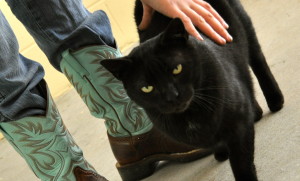In 2008 the National Cutting Horse Association voted to allow cloned animals to compete in their aged events. There were at least 2 clones entered in the 2009 NCHA Futurity show for 3 year olds, but neither ended up competing in the event. Cutting horse trainer Phil Rapp trained both fillies – Playboys Ruby Too, a clone of Playboys Ruby, and what’s on Tap, a clone of Tap o Lena. Neither filly was ever on the top of his list for the Futurity, and he called their abilities “average”, even going on to say that What’s on Tap “did not progress as a cutting horse”, and that Playboys Ruby Too was the stronger filly, but “needed to do more than turn both ways”. The mediocre performances of these two clones confirms that genetics alone don’t make a superior athlete, and that cloning a world champion or Olympic medalist doesn’t ensure success in the top levels of competition.
In 2012 the FEI (International Equestrian Federation) made a statement that clones and/or their offspring would be allowed to compete in international events, including the Olympics. The decision came too late for it to effect the 2012 summer Games. Horses in Olympic disciplines like eventing, dressage, and show jumping are often considered ‘aged’ – older than 10 – before they are experienced enough for the international stage, so even if clones were being aimed at the Olympics, they probably wouldn’t have been ready yet. Maybe in 2016?
Polo may be the one exception where we should expect to see cloned horses competing on a regular basis. Polo ponies are being cloned at a faster rate than any other type of horse. By 2013, one owner alone, top polo player Adolfo Cambiaso, is reported to have cloned his top horses almost 100 times! Adolofo says that his goal is to one day complete an entire polo match riding only cloned animals. In 2013 he took a step toward this goal by riding one of his clones, a mare named Show Me, during the Championship match of the Argentine National Open, which his team won. He scored two goals while riding the mare, who is a clone of an American Thoroughbred, named Sage. Cambiaso currently has over 50 clones in training, and more will be coming of age for competition soon.
Registered Clones? Cloned racehorses?
You won’t be hearing about clones of Secretariat, Man O War, or First Down Dash any time soon. Why? Both The Jockey Club, which registers Thoroughbreds, and the American Quarter Horse Association (AQHA) have policies that ban the registration of clones or their offspring. Thoroughbreds have to be registered with the Jockey Club in order to race, and similarly, QH racehorses must be registered with the AQHA. For this reason, it doesn’t make sense to go to the effort to clone racehorses, at least not until the rules on registration change, and those changes may be coming soon.
The AQHA is in the midst of a long standing legal battle over clone registration. A group of cloned QH owners filed a lawsuit against the AQHA in April of 2012, arguing that clones (and therefore their offspring) should be allowed to be registered. The AQHA refused to give in, stating that over 85% of their members were against the registration of clones. In July of 2013 the court ruled against the AQHA, but the organization is appealing the decision, and opening arguments of the appeal begin this very week.

